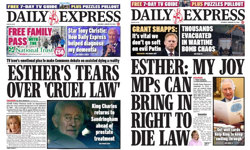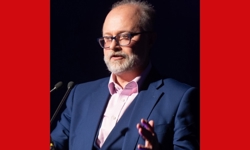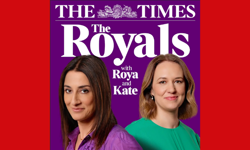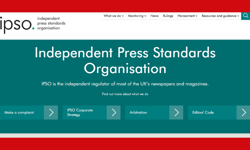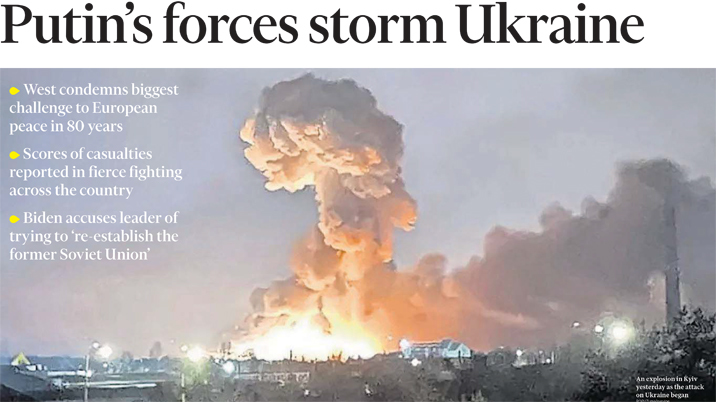
Live from Kyiv…
There are a lot of brave people in Ukraine. Some of them are journalists. And some of those are British journalists.
It sometimes seems daft – a waste of money – when lead news anchors present bulletins away from the studio. “This is Huw Edwards in Downing Street…” seems to add little value, other than for two rather than one person to get wet as he interviews Laura Kuenssberg in the rain. It is, of course, a symbol. Something important is happening and we need to be on the spot.
That spot is now Ukraine and there were sighs among the sceptical the day before the invasion last week when the Today programme opened with “This is Nick Robinson in Kyiv…” Clive Myrie had also been despatched. “BBC’s Robinson sparks outrage…” cried the Express. The BBC had experienced correspondents on the ground, why was he needed?
Just ask any news editor if they’d like an extra notebook, camera or mic on the scene of a breaking story. The problem is usually a lack of journalistic resources, not a surfeit of them. Robinson and Myrie are big names (as, indeed, are Lyse Doucet and Orla Guerin, who were already there) and would be big prizes for the Russians if there were a clampdown on foreign media. They knew they were risking their personal safety and freedom. Their style of reporting might not be to everyone’s taste. But Ukraine isn’t Downing Street; this wasn’t a vanity outing, it was a 6am wake-up call for anyone who hadn’t realised things were getting serious.
Something important is happening and we need to be on the spot.
Paucity of foreign correspondents
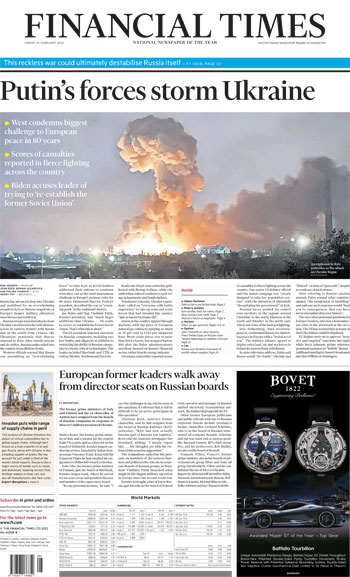
The Russian military build-up over the previous month can have left few in any doubt of Putin’s intentions, so most serious news organisations had their expert correspondents in position – if they had expert correspondents, that is. We have seen so many cuts over the past couple of decades that few can afford to staff up overseas bureaux. Where there might have been half a dozen reporters in America, based in Washington, New York, Los Angeles, now even the biggest operations keep just a single office and then send reporters dashing around the country as firefighters when stories break (or even across whole continents if it’s Africa or South America).
Some still have permanent cover in Washington, Paris, Brussels and Moscow, but Kyiv? Hardly. Time for stringers to come to the fore. Or for cash-strapped papers’ “chief foreign correspondents” and “world affairs editors”, including veterans like the Sun’s Nick Parker and the Independent’s Kim Sengupta, to dig out their wheelie cases and passports.
Other papers don’t have even that option. The Mirror and Express are sharing the services of the Mirror’s chief reporter Andy Lines, the i has despatched its economics editor and the Mail is depending on freelancer Ian Birrell.
These journalists are operating way out of their comfort zone in every sense of the phrase. It’s impossible not to applaud their efforts and to wish them well. But I’d still rather read what someone who really knows the territory has to say.
No wonder the FT has seen its digital subscriptions soar past the million mark. Its coverage has been in a class of its own.
Compelling covers
Back in the office, designers have also excelled themselves. I would find it impossible to choose a “front page of the fortnight” this time, so may I just highlight a few clean, compelling covers, starting with this pair from the Sun.
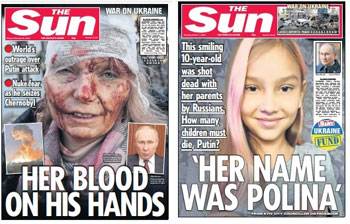
The woman injured in the opening attack featured on several front pages, but few managed to name her. The Sun called her simply “Helena, a teacher” – as did the Telegraph, which used her photograph inside. For the Mirror, she was “a teacher”, for the Times “a victim”, for the Guardian “an injured woman” and for Metro “Ukrainian woman” without even an indefinite article. The Express made no attempt at any identification, other than to plonk her picture on what was actually a very strong front page (apart from a picture of Boris Johnson where really Putin should have been).
Hats off to the Mail for finding out that that her full name is Olena Kurilo and that she is 53.
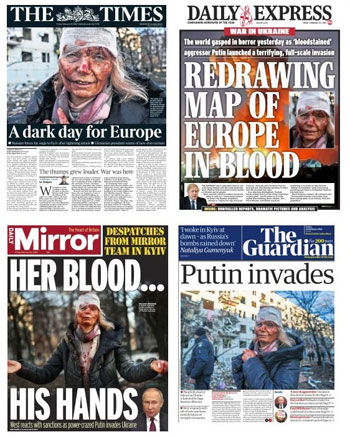
What about other news?
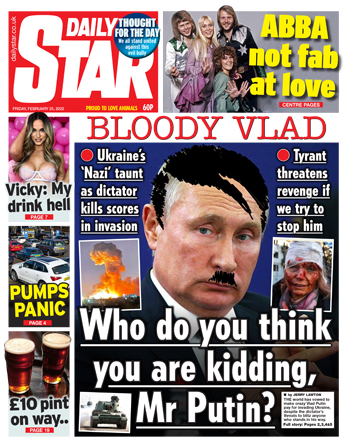
The invasion was such an obviously momentous event that almost everyone cleared their front pages of every other subject, removing puffs, ads and any other furniture. The exceptions were the FT, which kept its stock market stats but otherwise went all-out; the Telegraph, which kept its “rest of the news in brief” panel at the foot of the page; and the Daily Star, which decided that its readers also needed to know about Vicky’s drink hell and Abba. For a paper that has scored repeatedly in the past couple of years with its satirising of political leaders, the Putin-come-Hitler mockup was perhaps predictable, apposite even. But the mix jarred.
The Star did, however, put the story on its first spread, while the Telegraph decided even on day one that readers needed a break before being plunged into war on pages 4 and 5.
The Telegraph used to be the country’s best-selling “quality paper”, renowned for its extensive and detailed news coverage. Nowadays, it runs bigger and bigger pictures, which means it loses the advantage of being broadsheet in terms of squeezing in more words, and pagination is so tight that even the biggest stories cannot run for page after page, so it limited the invasion to six inside news pages. I was surprised, therefore, to discover that what looked like comparatively scant coverage wasn’t as far behind the Guardian as I’d thought, with a total of 11,359 words of news reports and eye witness accounts against 13,478 (this is excluding comment and leaders). The Times was way ahead with 17,207 over 13 pages and the Mail had 16,209 in its run from page 1 to the leader on page 22. The Sun came in at 7,391, across 11 news pages. Not bad for a “comic”.
Nowadays, it runs bigger and bigger pictures, which means it loses the advantage of being broadsheet in terms of squeezing in more words.
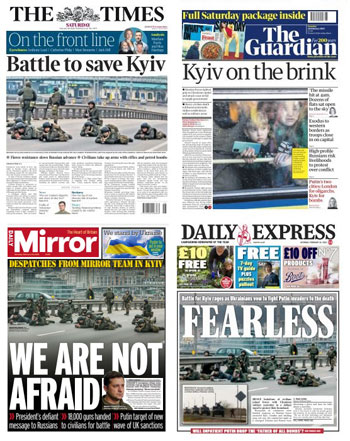
The full-throttle decision was an easy one on the day of the invasion, but day two was a Saturday, when the dynamic is completely different. The redtops and the i stuck with their posters, but the Express wasn’t giving up its free offers, while the Guardian promised its “full Saturday package” and the Telegraph an interview with Michael Vaughan. The time had come already to sell papers. And there are various ways of doing that. By offering something different, a change of tone; by saying that you’re doing the same as everyone else, but better; and by ramping up the big running story. The Times promoted its distinguished foreign team across the top of the front, the Mirror also highlighted its “team” in Kiev and offered a Ukrainian flag poster for readers to put in their windows, while the Mail – which the previous day had claimed to have the “sharpest” analysis and the “most dramatic” pictures – stuck a “War in Europe special” label alongside its Saturday titlepiece as though we were back in the 1930s. It may feel that way in many respects, but this wasn’t a good look.
As the week has gone on, more titles have pushed back their war coverage to allow fripperies on the early inside pages before knuckling down to the maps and graphics and analysis. There is a recognition that readers may not actually read all those thousands of words of harrowing testimony, armchair military strategy and psychological profiling – however worthy and intelligent much of them have been (and they have). Compassion is limited and there is a general acceptance that this is not going to end well, that there is nothing short of a Palace coup or assassination that will stop Putin.
But it is still the only story anyone is talking about. We’ve forgotten about Brexit, partygate, even the grand post-covid opening up. So papers have to persuade readers that theirs is the best coverage. Look at us, we’ve got pages and pages of stuff you’re going to skim over. Look at our fantastic columnists, our celebrity experts, our prime reporting team.
I’ve been through this from the first Gulf war, through the Balkans, Iraq, Afghanistan, Chechnya, the “colour revolutions” in the former Soviet republics. When you’re putting a paper together, these stories are intoxicating, you can’t get enough of them. There is so much to say, you want to publish page after page after page. You can’t leave out this bit about Abramovich or that bit about the kind-hearted village knitting socks for refugees; then there’s that fantastic colour piece from your star war correspondent. There are just so many goodies, you have to fill the front with promises and boasts. Other news, particularly the dry serious stuff, gets left behind, so that you end up with a paper overloaded with war stories and a disproportionate amount of fluff to leaven the mix. Politicians and policy issues escape scrutiny, the reader is left bloated yet unsatisfied after being served too many plates of one type of food, and the entire newsroom pats itself on the back for a job well done that smashed the opposition.
This, I think, could be called a disconnect.
It is still the only story anyone is talking about. We’ve forgotten about Brexit, partygate, even the grand post-covid opening up.
But still, there was excellent work done. Here are some more goodies:
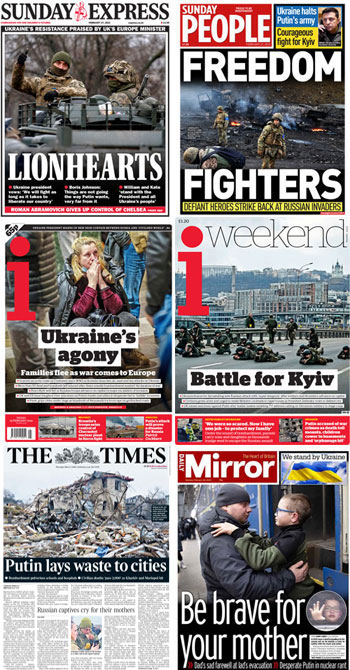
And please do read Henry Foy and Gideon Rachman in the FT, Marina Hyde in the Guardian, Catherine Philp and Anthony Loyd in the Times, Paul Waugh and Patrick Cockburn in the I – and many, many more.
Mail recognises Kyiv
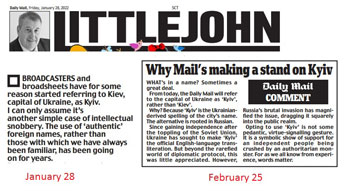
The Mail’s splash headline on the day of that “War in Europe special” was “Kyiv, the city of courage” - the first time the paper had used the Ukraine’s preferred spelling for its capital in a splash headline. As we noted a month ago, more and more organisations have adopted that form, which had bemused Mail columnist Richard Littlejohn, who described it as “intellectual snobbery”.
The paper changed its tune once Putin’s tanks crossed the border and at least had the courtesy to explain to its readers what it was doing. This was not a “pedantic virtue-signalling gesture”, but a show of solidarity for an independent people being crushed by an authoritarian monster. The panel, headlined “Why Mail’s making a stand”, acknowledged that Ukraine had pushed for this spelling since it gained independence, “but beyond the rarefied world of diplomatic protocol, this was little appreciated”.
Which is an interesting way of saying “we’re finally catching up with what everyone else has been doing for at least a month, and in some cases, for years”.
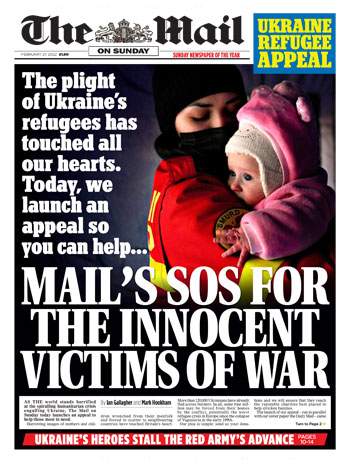
As we see from the headline here, there is almost no situation that cannot be turned to be about the Mail rather than the people it’s supposed to be reporting on.
In the 1950s, Audrey Hepburn starred in a film called The Nun’s Story and I’ve always remembered a scene in which she, a star pupil, is urged to flunk her final exams to show humility and to encourage those less able. She is reluctant and suggests that she would do so, so long as everyone knew that she would have passed. That, she was told, would destroy the whole purpose of her sacrifice.
It’s strange how a short scene from a film watched in childhood can have a lifelong impact, but since then I have cherished the notion of modest benevolence.
For a paper that so loathes “virtue signalling”, the Mail titles have not suffered from modesty. And so on the third day of this war, the first word of the Mail on Sunday’s main headline was “Mail”. It was launching an appeal to help the women and children fleeing the conflict. Send us your money, it said, and we will pass it on to “reputable” charities that it did not name.
Two days earlier, other papers had run panels on “What you can do to help”, including details of the Red Cross and Unicef appeals. Once again the Mail was playing catch-up and grandstanding. It works. As I write, readers have donated more than £1.25m, the proprietor has contributed a pump-priming £500,000 and another £250,000 from the Glasgow gas generator manufacturer Peak Scientific.
I’d love to put the apparent success of this appeal into context, but despite repeated inquiries, the Red Cross is coy about how much it has received. (In other words, it’s not replying to my emails and calls.) Unicef is looking to raise $1.7bn and collected £1m in the UK over four days.
You can’t help but admire the Mail’s campaigning ability, if only it didn’t blow its own trumpet quite so forcefully.
Sun’s Red Cross appeal
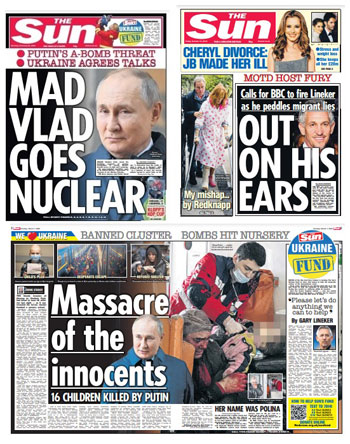
The Sun, too, joined the appeal bandwagon, the day after the Mail. It is going to send readers’ cash direct to the Red Cross. Its front-page launch seemed to have a clearer sense of perspective of what mattered – a beside-the-titlepiece puff above a big splash and then a reasonable show inside (although the page was slightly spoilt by an incongruous “Klopp’s Kop cup” panel – presumably justified on the ground that Liverpool had been playing Abramovich-owned Chelsea and this was therefore a symbolic defeat for Russia).
It pushed the boat out a little further on Tuesday, including a piece written by Gary Lineker, urging readers to do their bit to help refugees.
That’s the Gary Lineker who should have been “out on his ears” for his “showboating” suggestion that people should welcome refugees back in 2016 (in a splash written by Nick Parker, now the paper’s man in Kyiv). Oh how short memories are.
And what about Russian influence in London…
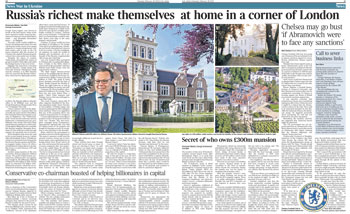
Memories are, indeed, short across the board. Too many papers seemed to forget that there was a Bill going through Parliament to make it close to impossible for refugees to come here, even as Priti Patel was coming under fire for her refusal to join other European countries in waiving visa requirements for Ukrainians. It took three days for the Government to soften, if not change, and explain its stance. Hardly anyone reported the Lords amendments excising clauses that peers said broke international law. They will almost certainly be put back in when the Bill returns to the Commons. Kind-hearted, global Britain.
Nor did many papers bother to note that new laws banning noisy protests in this country were being passed at the very moment they were lauding anti-war protesters in Russia. Nor, beyond the property porn of oligarchs’ mansions, has there been much appetite for examining the way the UK has sought to attract roubles to London and our reputation as a launderette for questionable regimes. Or for revisiting the Russia Report on Putin’s interference in western elections (remember there was no evidence of that in the Brexit vote – because the security services didn’t look for it).
The Times noted that Tory party co-chairman Ben Elliot’s Quintessentially “concierge” service for the super-rich had “boasted” of its dealing with Russian millionaires, but chose not to reference its previous stories of the million-pound-plus contracts under which taxpayers’ money was used to schmooze with foreign investors. And I haven’t seen too many reminders in the Telegraph, Mail, Express or Sun of those Conservative party fund-raising auctions where Russians paid tens of thousands for tennis matches with Rishi Sunak or Boris Johnson.
Only ourselves to blame
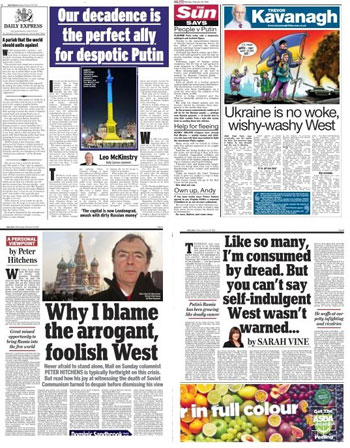
There has, however, been a fair chunk of “woke leftie” bashing, along the lines of “the West has only itself to blame because it’s too busy worrying about climate change and pronouns, black lives mattering and toppling statues of slave traders and colonialists”.
In these scenarios, it feels like going back to the “she was asking for it” condemnation of the rape victim, with “weak” Biden rather than Putin the villain.
Peter Hitchens, Charles Moore and Leo McKinstrey were among those to play this tune on their old fiddles. The Mail seemed to regard Hitchens as so out of key that it was necessary to label his polemic “A personal viewpoint”, while Moore in the Telegraph summed up the “Western decadence” gripe in the paragraph: “For 30 years now, and particularly since the New Labour, New Everything era that began in 1997, we have pursued a politics which is almost proud of its self-indulgence. The big issues have concerned ethnicity, sexuality, gender, personal identity and a green lifestyle – a luxurious world where we can all become picky about dietary preferences, micro-aggressions, well-being, pronouns and carbon neutrality…
“It is somehow fitting that in the week Putin begins to re-erect the Iron Curtain across Europe, our Air Force Board has been meeting not to discuss denying air space to Russian planes over Ukraine but to debate whether or not Andrew Turner, one of two deputies of the Air Chief Marshal, offensively bared his buttocks in his own garden.”

Moore was, you might say, being wise after the event. But the Mail had been on the ball the very day before the invasion. Britain’s spies were being told to consider their “white privilege” and their choice of pronouns “as Europe descends into war”. Except the internal civil service paper was written in October and distributed in December, so a while before Putin was amassing his tanks. And, anyway, it is possible to walk and chew gum. Suggesting that people show courtesy to one another does not mean you can’t also do your job of checking whether a superpower is planning to go to war.
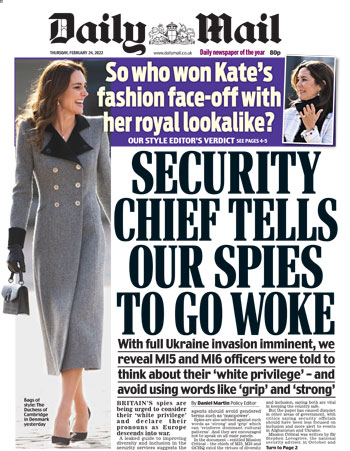
The media may be susceptible to “dead cat” distractions; that doesn’t mean everyone else is too.
There is a strangely pleasing symmetry in these interpretations of the situation – specifically Charles Moore’s world view. He thinks Putin has risen to near absolute power because limp lefties have too much sway in western democracies. There is a school of thought (and some evidence) that the opposite is the case: that Putin’s machinations are at least partly responsible for what has happened in the West over the past decade: the rise of Trump, Brexit and Johnson. All of which are things Lord Moore has celebrated.
Suggesting that people show courtesy to one another does not mean you can’t also do your job of checking whether a superpower is planning to go to war.
Volodymyr Zelenskyy
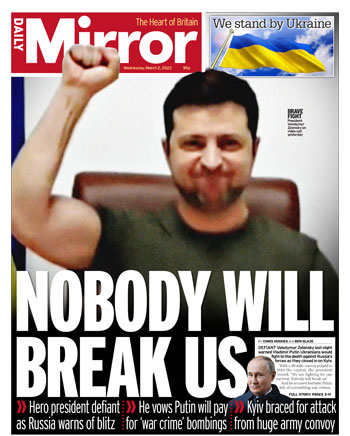
The hero is, of course the Ukrainian President. He used to be a comedian, you know. Just as Putin used to be a KGB officer, Johnson used to be a journalist, and Paul McCartney used to be a Beatle. Some things don’t have to be repeated every time you mention someone. (I apologise; McCartney is a bugbear. I once asked a reporter how old he was after he submitted copy using the “former Beatle” descriptor. He was born ten years after the group disbanded: McCartney had been a famous musician his whole life, but never as a Beatle, so why did he have to have that history dragged up every time he did something?)
The President’s name is tricky for we westerners. He spells it Volodymyr Zelenskyy. Most papers drop the second “y” in his surname; the Guardian goes for Zelenskiy. The Sun alone (as I write) uses the double “y”. Good shout. Seems most have yet to learn the lesson of Kyiv.
Front page of the fortnight
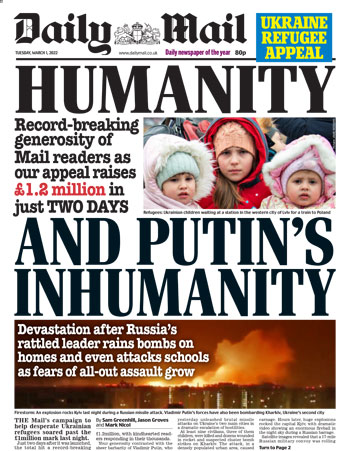
As I said earlier, I couldn’t possibly choose. There are so many good ones. But this, from the Mail on Tuesday, was an absolute stinker. It is ugly, contrived and self-absorbed (but well done on the £2m).
Briefly, in other news...
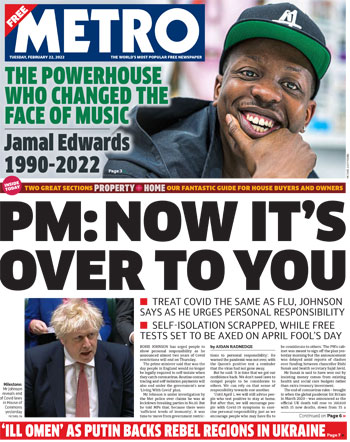
Congratulations to Metro for recognising the importance of Jamal Edwards while almost everyone else floundered.

Helen Mirren returned to the front page of the Times, extending her lead over Dame Judi Dench. More of that another time.
Liz Gerard’s Notebook is a fortnightly column published in the InPubWeekly newsletter. To be added to the mailing list, enter your email address here.




